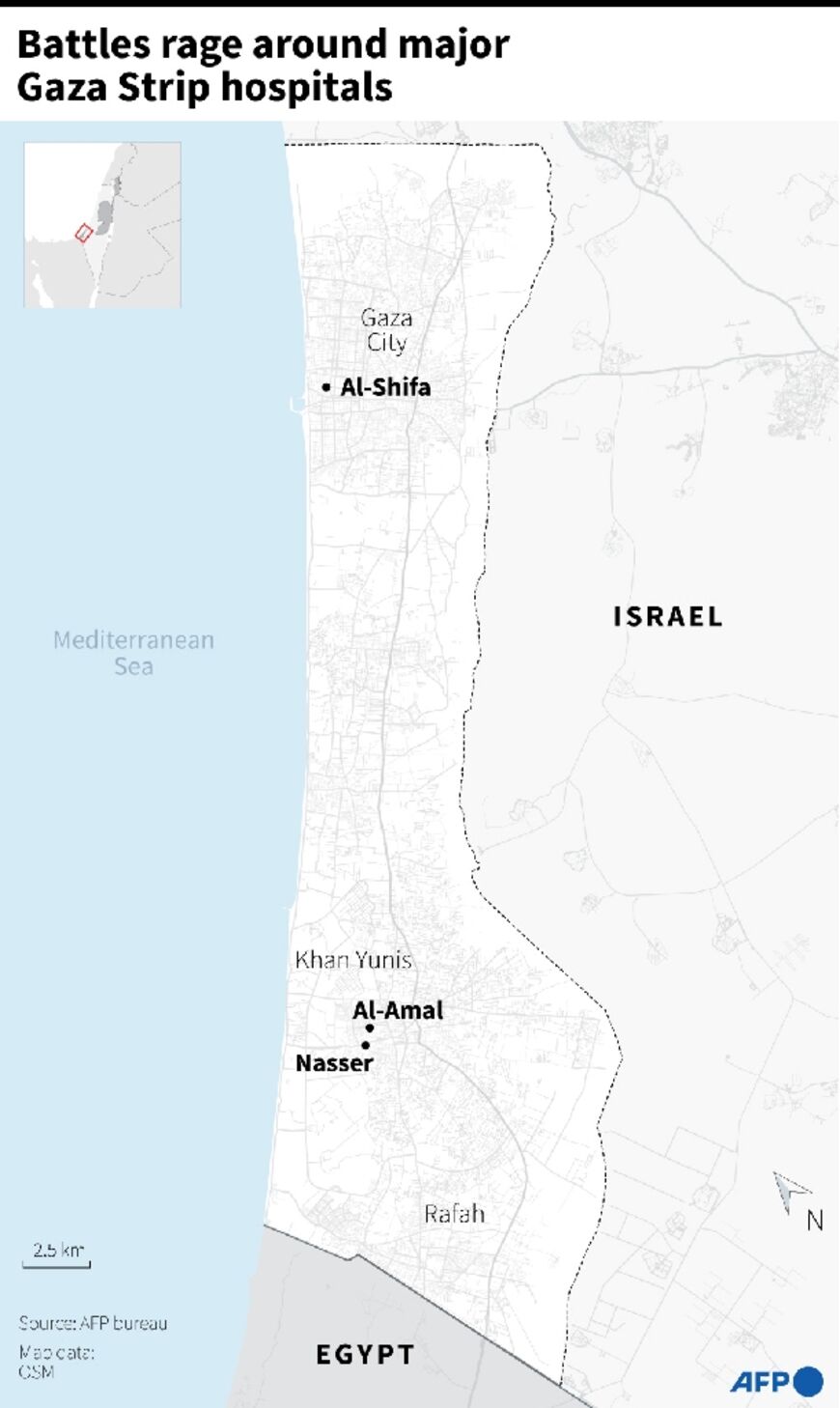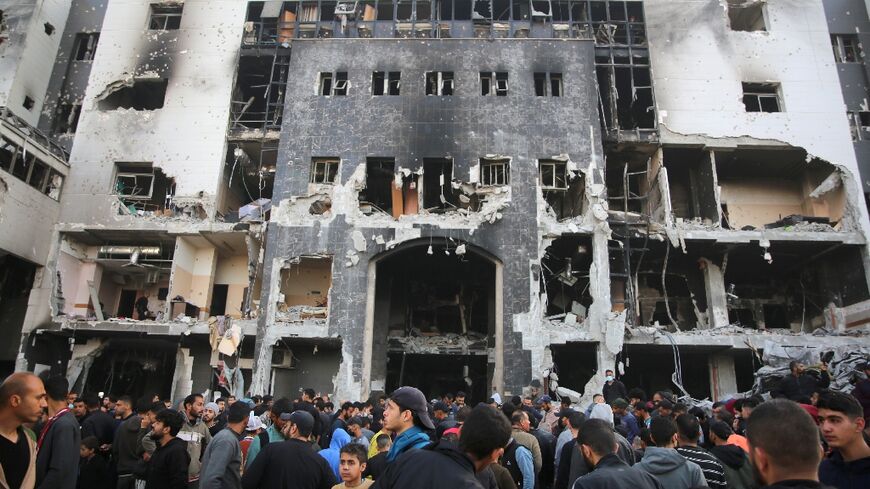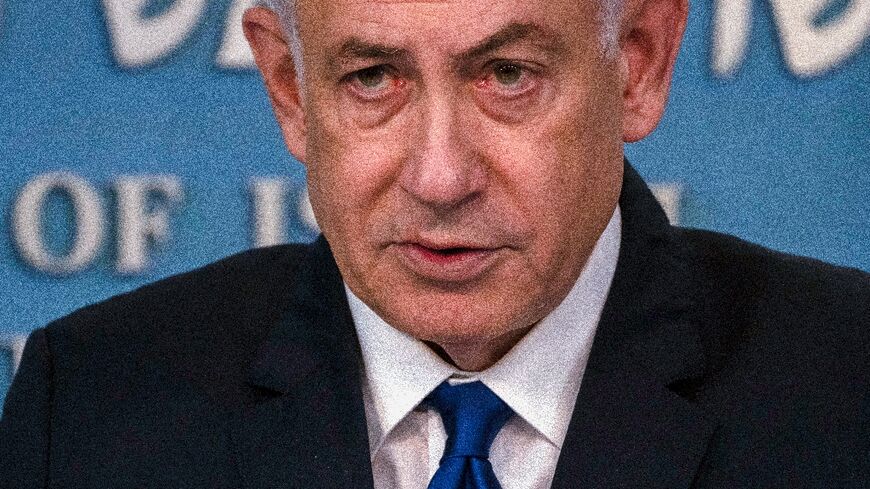Gaza's Al-Shifa hospital devastated in two-week battle

Israeli forces on Monday pulled out of Gaza's largest hospital complex after an intensive two-week military operation against Hamas, leaving behind charred buildings and bodies in the sprawling complex.
Further raising regional tensions during the Gaza war, Israeli air strikes destroyed an Iranian embassy consular annex in Syria, Damascus and Tehran said. Iran's Revolutionary Guards confirmed two high-ranking generals were among 11 people reported dead.
The Israeli army carried out what it called two weeks of "precise operational activity" at the Al-Shifa complex in Gaza City, before declaring Monday that forces had withdrawn.
Israel said it had battled Palestinian militants inside the Palestinian territory's largest hospital, killing at least 200 and recovering stockpiles of weapons, explosives and cash.
Daniel Hagari, Israeli army spokesperson, said Israel had "apprehended over 900 individuals suspected to be involved in terror activity", of which he said "over 500" were "defintely" Hamas or Islamic Jihad militants.
"There are more terrorists in the hospital than patients or medical staff," he said, adding that there were about 300 patients, doctors and medical staff.
Hamas has denied operating from Al-Shifa and other health facilities.
A spokesman for Gaza's civil defence agency said Israeli forces killed about 300 people in and around the hospital over the two-week operation.
The health ministry in Hamas-ruled Gaza said "the scale of the destruction inside the complex and the buildings around it is very large".
"Dozens of bodies, some of them decomposed, have been recovered from in and around the Al-Shifa medical complex," it said, adding the hospital was now "completely out of service".
Most of Gaza's hospitals are no longer functioning, the UN has said.
- 'Deeply concerning' -
Several doctors and civilians at the damaged complex told AFP that at least 20 bodies had been found, some of which appeared to have been driven over by military vehicles.
Several were found close to the west entrance to the complex, which the Israeli army used during its departure from the hospital grounds on Monday.
"Bodies... The tanks went over them. Destruction. Children. Innocents. Unarmed civilians. They (soldiers) went over them," one witness said, asking not to be named.
An AFP correspondent saw one badly decomposed body bearing tyre marks, although it was not known when it was driven over.
The White House said it would press Israel for more information, calling the reports "deeply concerning".
The military has in recent days released footage of its fighters moving through the hospital's corridors, and pictures of large numbers of assault rifles, grenades and other weapons it said were recovered from the maternity ward.
The Hamas government press office said the army had blown up more than 20 houses within 24 hours in the main southern city of Khan Yunis, where battles have also raged around the Nasser and Al-Amal hospitals.
- Israel street protests -
The bloodiest ever Gaza war erupted with Hamas's unprecedented October 7 attack which resulted in about 1,160 deaths in Israel, mostly civilians, according to an AFP tally of Israeli official figures.
Israel's retaliatory campaign, aimed at destroying Hamas, has killed at least 32,845 people, mostly women and children, according to the Hamas-run health ministry in Gaza.
In a statement, Hamas -- which is backed by Iran -- acknowledged the "exhaustion" of Gazans, while vowing to continue fighting until it achieves "freedom" for Palestinians.
The Israeli military said Monday that 600 soldiers had been killed since the start of the war -- including 256 in the Gaza ground invasion since late October.
The world's top court has ordered Israel to "ensure urgent humanitarian assistance" in Gaza without delay, saying "famine is setting in".
Foreign powers have ramped up aid airdrops, although UN agencies and charities warn this falls far short of the dire need and say trucks are the most efficient way of delivering aid.
A second ship carrying relief goods by sea from Cyprus was seen just off the coast of Gaza on Monday.
Meanwhile Israeli Prime Minister Benjamin Netanyahu on Monday maintained "his daily routine from hospital", his office said, following a hernia operation on Sunday.
He will be discharged on Tuesday afternoon, it added.
During their attack on Israel, Palestinian militants also seized around 250 hostages. Israel believes about 130 remain in Gaza, including 34 who are presumed dead.
Netanyahu is under rising pressure from the families of hostages as well as anti-government protesters, whose nightly rallies have drawn thousands onto the streets.
On Monday, Netanyahu vowed to ban broadcasts from Israel by Qatar-based news channel Al Jazeera, after the Israeli Parliament granted him new powers. He called it a "terrorist channel".
The broadcaster said the Israeli PM's comments were a "dangerous ludicrous lie".
- Damascus strike -
The war in Gaza has raised fears of a wider regional conflagration, with repeated violence linked to the conflict in Iraq, Lebanon, Syria and Yemen.
Those fears intensified on Monday with strikes in Damascus on the consular annex of Israel's arch-foe Iran.
The Syrian Observatory for Human Rights, a war monitor based in Britain, said 11 people were killed.
The Islamic Revolutionary Guard Corps said seven members were killed, including two senior officers, Brigadier General Mohammad Reza Zahedi and Brigadier General Mohammad Hadi Haji Rahimi.
Israel did not comment, but Iran vowed a "decisive response" to the attack and called on the international community to act.
Hamas called the attack a "dangerous escalation".
Zahedi -- who according to Iranian state TV was part of the Revolutionary Guards' foreign operations arm, the Quds Force -- is one of a number of high-profile figures targeted by Israel during the Gaza war.
burs-dcp/it/rox/tw









